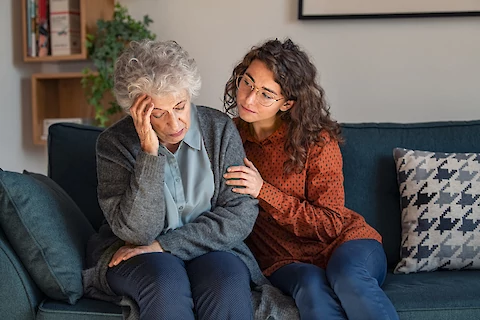
Are you living with a senior family member with Alzheimer's Disease? If so, you may have come across the term "sundowning." It is a phenomenon where seniors with Alzheimer's experience increased confusion, agitation, and anxiety during the late afternoon and evening hours. It can be challenging for both the seniors and their loved ones, but understanding the triggers of sundowning and taking steps to avoid them can make a significant difference in their well-being.
This blog post will discuss the top triggers you should be aware of and share some simple, practical tips you can incorporate into your daily routines to help minimize the risk or severity of sundowning episodes.
Top Triggers of Sundowning to Avoid
There are a few significant sundowning triggers to know about. Here are a few top triggers:
Fatigue
Fatigue can help increase the likelihood of sundowning. Ensuring that your senior loved one gets enough sleep at night is crucial in reducing sundowning episodes. Encourage them to take regular naps during the day to make up for any sleep deficit. Creating a relaxing bedtime routine, such as reading a book or listening to calming music, can also help improve their sleep quality.
Hunger or Dehydration
Both hunger and dehydration can exacerbate sundowning symptoms. To prevent this, make sure to provide regular meals and snacks throughout the day. Additionally, encourage your senior to drink water frequently to stay hydrated.
Overstimulation
Loud noises and bright lights can overstimulate a senior with Alzheimer's, leading to increased agitation and anxiety during the evening hours. To prevent this, create a calm and quiet environment in the evening by limiting exposure to loud noises and bright lights.
Disorientation
Confusion about time and place can contribute to sundowning episodes. Help your senior stay oriented by making clocks and calendars easily visible and maintaining a consistent daily routine.
Tips for Incorporating These Strategies into Daily Routines
- Creating a daily schedule that includes regular meal times, naps, and a bedtime routine will help provide consistency and predictability for your senior loved one with Alzheimer's. This consistency can reduce confusion and minimize sundowning symptoms.
- Make small adjustments to the home environment, such as adding nightlights or closing curtains in the evening, to create a calm and comforting atmosphere. These easy changes can make a big difference in reducing sundowning episodes.
- Maintain open communication with your senior's healthcare provider to ensure medications are not contributing to sundowning episodes. Be proactive in discussing and monitoring the effects of all medications on their overall well-being.
Additional Support and Resources
Family members and caregivers should educate themselves about Alzheimer's Disease and sundowning. Understanding this condition helps you provide the best possible care for your senior loved one.
You can also seek support from local Alzheimer's support groups or online forums. Connecting with others who have similar experiences can provide valuable insights and encouragement during challenging times.
Get Personalized Care and Assistance From Senior Helpers Now
Understanding and avoiding sundowning triggers is crucial for seniors with Alzheimer's Disease and their loved ones. By incorporating these tips into your daily routines, you can minimize the risk or severity of sundowning episodes and create a more serene and comfortable environment for your senior family member.
If you live in Sun City Center, Riverview, Brandon, Valrico, Tampa, or Lithia, contact Senior Helpers Hillsborough County for professional assistance and support in managing your loved one's Alzheimer's care. Our compassionate caregivers can help you create a safe, comfortable environment for your senior family member.